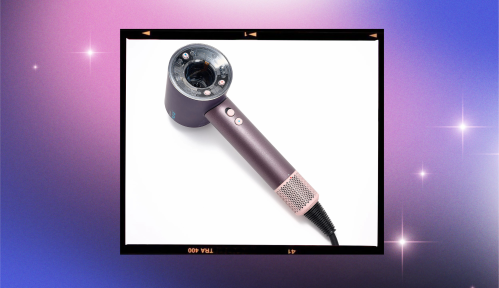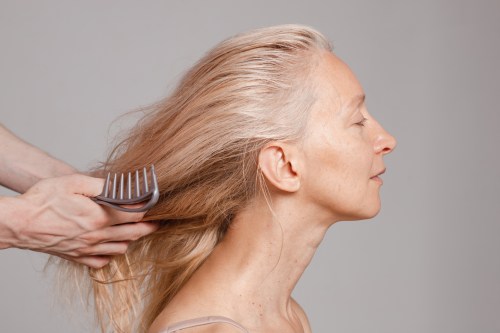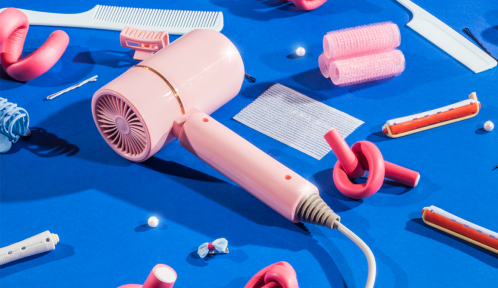9 things you never thought to ask a dermatologist about your hair
Did you know that hair falls under the purview of your dermatologist? We asked the questions about hair—and got the answers—so you don't have to.

Every so often, I’ll notice apocalyptic-level hair loss in the shower—as in, major clumps released in the rinse process. Alarm bells ring, Google searches ensue, and neglected biotin supplement consumption resumes. Instead of freaking out, however, I could just go to my dermatologist to be evaluated because, as it turns out, hair thinning/loss is one of the most common conversations they have with their patients.
If you’re like me and only see your derm for mole checks every few years, it might be awhile before you get in to interrogate them around your mane-centric concerns. My panics most often come and go by the time I finally get in for an appointment, after which point the issue mysteriously resurfaces in time to wait another three years for evaluation.
Stylists and colorists, who you may see more often, can be great resources to fill this void, but some questions are best posed to doctors. I reached out to a MDs to find out what questions they get asked most frequently with respect to their patients’ hair in the hopes of either saving you a co-pay or motivating you to get a date with the doc on your books. After all, hair may not be the window to your soul, but it can be a thermometer of sorts for your overall health (or, at the very least, a cry for help around your styling practices).
9 hair-centric questions I asked dermatologists so you don’t have to
1. Is my hairline determined by my mother’s father?
This patient inquiry, says NYC-based dermatologist Joshua Zeichner, MD, is born of an old wive’s tale. “While your hair thickness is determined by your genetics, it is a myth that it is determined by your maternal grandfather,” he explains. “Your loss is polygenic, meaning that mom’s genes and dad‘s genes come together, and it is the combination of these genes that determine how thick your hair is.”
2. Can pulling back my hair back cause thinning?
Short answer: Yes. “Excessive tension on the hair may result in permanent hair loss, especially along the front and sides of the scalp,” says Dr. Zeichner. “Known as traction alopecia, the hair follicles are damaged from constant pulling of the hair. It is commonly seen when patients wear their hair in braids,” he explains.
3. Why is my hair so damaged?
New York City-based dermatologist Dendy Engelman, MD, gets this one a lot, and says there are many potential culprits when it comes to damaged hair. The most obvious are chemical hair treatments and use of hot tools. As with all things hair-related, genetics can play a role, too. Birth control, in the form of oral contraceptives, can also damage hair in some cases. UV exposure may be to blame as well. “Exposure to free radicals [from the sun] without antioxidants to neutralize them can cause serious oxidative stress to the body and in this case the hair,” Dr. Engelman explains. “The unstable molecules steal from other molecules, weakening them in the process, and some studies have shown that this can speed along the catagen phase which causes hair to detach prematurely. Finally, weight loss, which can be a stressor, causes follicles to become less active.
Diet, she says, is also really important for hair health. “The hair is made up of protein; and we need fats, Vitamin B, Vitamin A, and iron to support growth and strength,” she explains. “Low levels can lead to hair loss, and the fix may be as simple as adding an iron or vitamin supplement or adding lentils, eggs and spinach to your diet.”
4. How many hairs is normal to lose in a day?
Dr. Engelman tells me this is a common question, too. It’s normal to lose 100 individual hair strands a day, she says. “We’re animals, so we shed,” adds NYC-based dermatologist Mona Gohara, MD.
5. What are the signs that my hair is thinning?
Are the clumps I’m pulling out in the shower A-OK, or am I about to be bald? Dr. Engelman tells me I’m far from the only person to ask her this, and says that signs of excessive hair loss include visible scalp, more than normal shedding (100 hairs per day), and breakage.
6. Why is my hair thinning/am I losing my hair?
All three derms tell me this is one of the top questions they get in practice. The answer is intensely individual. “There are multiple reasons why hair could be thinning or falling out, the first of which is some type of metabolic syndrome, like a thyroid abnormality or anemia or [because someone is] choosing to be vegan or vegetarian and may not be getting iron in their diet,” says Dr. Gohara. The second reason is shedding, whether that’s the normal 100 hairs per day or something more extreme like post-childbirth shedding or stress shedding. A third reason, says Dr. Gohara, is over processing. “At some point the hair is just like, ‘I don’t want this color anymore, I don’t want these chemicals anymore, I don’t want this hot iron anymore, and it just breaks and rebels and is tired and weak,” she says, adding that this eventually happens to everyone and that it’s just a matter of how long your hair can last. A fourth reason has to do with medications that may cause hair thinning, and the fifth is genetic—it’s just the time for your hair to thin, according to your particular genetic code. And finally, good old hormones can cause hair loss, too, including those which kick in around perimenopause.
7. How can I stop my hair from thinning?
This, too, is a question all three doctors hear frequently, and they say there are myriad ways to prevent hair loss. “Minoxidil—not new or sexy, but very effective—works to decrease hair shedding and promote new hair growth,” Dr. Engelman explains. “Minoxidil’s mechanism of action is believed to be due to an effect on the calcium channels in the hair cells. Minoxidil increases the capillary blood flow to the dermis of the skin where the follicle resides—promotes oxygen, blood, and nutrients to the hair follicles—to make them stronger and help re-grow hair,” she explains. Over-the-counter Rogaine and some dietary supplements, like viviscal, are also effective, says Dr. Zeichner, who adds that prescription options such Propecia or spironolactone can be acquired after a visit to your dermatologist.
In-office treatments are also on the rise. Among the most common is platelet-rich plasma, or PRP, with Dr. Engelman says is very effective (but requires upkeep over time). “It’s a hair loss treatment that withdraws a patient’s own blood, processes the enriched cells, and injects them back into the scalp,” Dr. Engelman explains. “The platelet-rich plasma contains the proteins needed to stimulate hair growth.” Botulinum toxin (Botox) is being studied for hair regrowth as well, says Dr. Engelman. “The initial studies show promise with 50 percent of test subjects experiencing new hair growth,” she says. “These results aren’t published yet, but my colleagues who only work in hair restoration substantiate these numbers.”
8. What’s causing this issue on my scalp?
Dr. Gohara tells me she sees patients often who have problems around their scalp, including dandruff, eczema, psoriasis, and allergic reactions. Sometimes these are due to specific product use and sometimes they’re related to autoimmunity, etc. They’re not just uncomfortable, either—in some cases, she tells me, scalp conditions can facilitate hair loss. “I always tell my patients whenever you notice a change in anything about your hair or your skin or your nails, get it checked,” she says.
9. Why isn’t my hair growing as fast as it used to?
When patients ask Dr. Gohara this question, the answer is usually that their hair has always been slow growing and they just happen to be noticing it now (perhaps because they’re trying to grow it out to a new length). The rate at which hair grows, she says, is genetic.
Not sure how fit your strands are? Try this 2-step test to find out. Plus, if you’re not up on hair milk, you’re missing out. (Next up, almond hair milk?)
Sign Up for Our Daily Newsletter
Get all the latest in wellness, trends, food, fitness, beauty, and more delivered right to your inbox.
Got it, you've been added to our email list.










